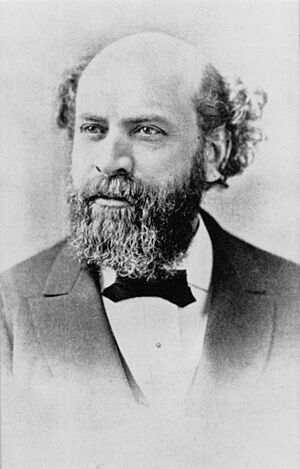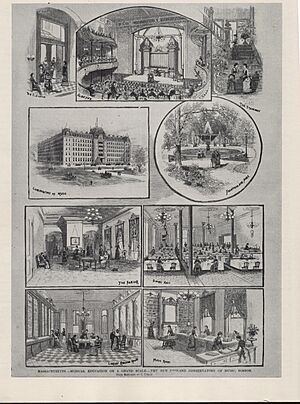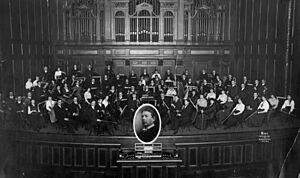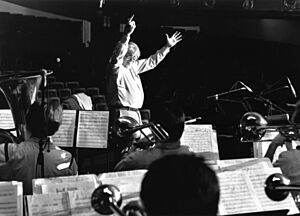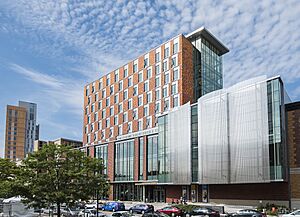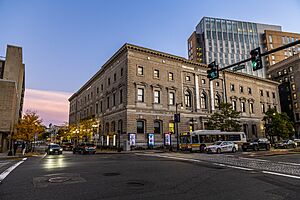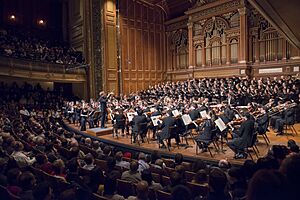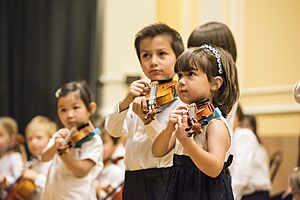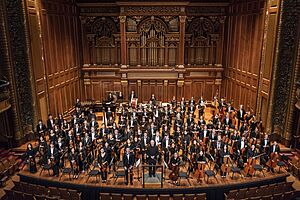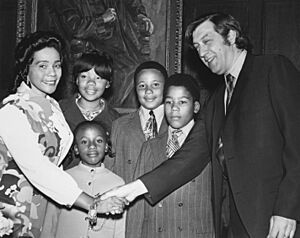New England Conservatory of Music facts for kids
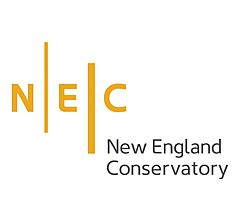 |
|
| Type | Private music school |
|---|---|
| Established | February 18, 1867 |
| Endowment | $89.6 million |
| President | Andrea Kalyn |
| Students | 750 |
| Location |
,
,
United States
|
| Campus | Urban |
|
New England Conservatory of Music
|
|
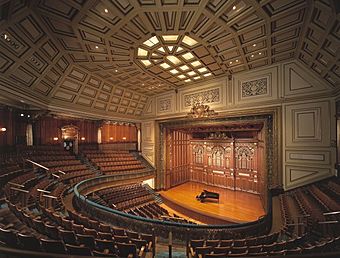
Jordan Hall
NEC's principal performance space |
|
| Location | 290 Huntington Ave. Boston, Massachusetts |
| Area | 1 acre (0.4 ha) |
| Built | 1903 |
| Architect | Wheelwright & Haven |
| Architectural style | Renaissance |
| NRHP reference No. | 80000672 |
| Added to NRHP | May 14, 1980 |
The New England Conservatory of Music (NEC) is a special private music school in Boston, Massachusetts. It's located on Huntington Avenue, a famous street known as the "Avenue of the Arts." This street is also home to the Boston Symphony Hall.
About 750 students attend NEC for college and graduate studies. Another 1,500 students are part of its Preparatory School and School of Continuing Education. NEC offers many different music programs. You can study classical music, jazz, or even how to compose new music. They also teach about music history and theory. NEC works with Harvard University and Tufts University too. This allows students to earn two degrees at once over five years.
Contents
History of NEC
How NEC Started (1867)
In 1853, a young music teacher named Eben Tourjée tried to start a music school in Boston. He wanted it to be like the famous music schools in Europe. But a group of important music leaders in Boston said no. They thought it was a bad time because of the country's problems, which led to the American Civil War.
After the Civil War ended, Tourjée tried again in 1866. This time, he had more experience. He had already started three successful music schools in Rhode Island. He convinced the Boston leaders that a music school was truly needed. So, on February 18, 1867, the New England Conservatory officially opened. It started with just seven rented rooms above the Boston Music Hall. That original building later became a theater called the Orpheum Theater, which is still there today.
Early Years (1868–1900)
Eben Tourjée became very active in the music community. He helped organize the first national meeting for music teachers in 1869. He also helped put together a huge chorus of over 10,000 singers. They performed in Copley Square to celebrate the end of the Civil War.
NEC was a leader from the very beginning. It was the first school in the U.S. to offer a course for teaching music in public schools. One of its teachers, Luther Whiting Mason, even helped bring music education to schools in Japan.
By 1868, NEC had grown a lot. It went from seven rooms to twenty-five, with over 1,200 students. Tourjée also worked with Boston University. He wanted to give music students a more complete college education.
In 1882, NEC needed even more space. It moved to the St. James Hotel in Boston's South End. This big building was both a school and a place for female students to live. NEC soon built a new concert hall next to the hotel. This hall, called Sleeper Hall, opened in 1886. It was used for many concerts and student performances.
NEC also built strong connections with the Boston Symphony Orchestra. When the orchestra started in 1881, 19 NEC teachers became its main musicians. These close ties continue even today.
The 20th Century at NEC
Around 1900, George Whitefield Chadwick became the head of NEC. He was a famous composer and had been a teacher there since 1882. Chadwick helped shape NEC into what it is today. He saw that the school needed a new building. He chose a spot on Huntington Avenue, which was becoming a cultural hub. The new Jordan Hall building opened in 1902. The concert hall officially opened on October 20, 1903, with a big performance by the Boston Symphony Orchestra.
Chadwick also started the first full orchestra and opera program at NEC. He changed the school's focus. Instead of just casual lessons, NEC began to focus on students who wanted to earn college degrees.
Like many schools, NEC saw fewer students during the Great Depression and World War II. But after the war, in 1946, student numbers doubled. Many students came through the G.I. Bill to get their college degrees after serving in the war.
In the 1950s, President Harrison Keller helped NEC grow again. He encouraged students to get degrees, including master's degrees. He also started the Artist Diploma program for very talented performers. Keller also created the Department of Music for Young People, which is now NEC's Preparatory School. A new student dorm opened in 1960.
In 1967, Gunther Schuller became President. He was a composer, conductor, and writer. Schuller made big changes, just like Chadwick. In 1969, he started the first fully recognized jazz degree program in the U.S. A few years later, he introduced "Third Stream" studies. This was a new idea that combined jazz and classical music. This program is now called Contemporary Musical Arts (CMA). It includes many different music styles from around the world. Schuller also helped bring back interest in ragtime music. He formed the New England Conservatory Ragtime Ensemble in 1971.
From 1983 to 1996, Laurence Lesser, a famous cellist, led NEC. During his time, the campus grew with two more buildings. He also helped raise money to fix up Jordan Hall in 1994–95. He started the Doctorate of Musical Arts (DMA) degree and many other graduate programs.
The 21st Century at NEC
Daniel Steiner was president from 1999 to 2006. He was the only president who wasn't a musician. His goal was to make NEC a top music school, like MIT and Harvard. He created a joint-degree program with Harvard. He also improved financial aid and hired great teachers. NEC grew in size and reputation during his time.
Tony Woodcock was president from 2007 to 2015. He started new programs for musicians. He also began the building of the Student Life and Performance Center (SLPC). This was the first new building for the school since 1960.
In January 2019, Andrea Kalyn became NEC's 17th president. She is the first woman to hold this position. She quickly showed her commitment to making NEC more diverse. She started the Center for Cultural Equity and Belonging. This center works to make sure everyone feels welcome and included at NEC.
NEC Campus
Today, the NEC campus has four buildings. They are located on both sides of Gainsborough Street, near St. Botolph Street and Huntington Avenue.
The main building is often called "the Jordan Hall Building." It holds Jordan Hall and three smaller performance spaces. It also has the Performance Library, teacher offices, and student practice rooms. The building at 33 Gainsborough Street is called "33 G." It has administrative offices, a copy center, a store, and more practice rooms. The "St. Botolph Building" has Pierce Hall, classrooms, and more offices.
NEC's newest building is the Student Life and Performance Center (SLPC). It opened in 2017 and is now the main student dorm. It also has a café, a library, rehearsal spaces, and a theater for opera performances.
Jordan Hall
Jordan Hall is NEC's most famous and important performance space. It officially opened in 1903. It was a gift from Eben D. Jordan Jr., whose family started the Jordan Marsh stores. He was also a musician himself.
When Jordan Hall opened, newspapers said it was "unequaled the world over." The Boston Globe reported that it was "a place of entertainment that European musicians who were present that evening say excels in beauty anything of the kind they ever saw." The hall was updated in 1995 to keep it in great condition.
What Students Learn at NEC
Getting into NEC is tough! Students first send in a video audition. Then, if they pass, they have a live audition. NEC offers degrees in many areas. These include playing instruments, conducting, piano, jazz, and composing. You can also study opera, music history, and music theory. NEC also offers smaller courses in Liberal Arts and Music Theory. There's even a focus on Music Technology.
Artist Diploma
The artist diploma (AD) is the highest performance award at NEC. Very few students are accepted into this program each year. It usually lasts two years. Students in this program get a full scholarship and money for living expenses. They often perform in special concerts and events.
Doctoral Programs
The Doctor of Musical Arts degree (DMA) is a very challenging program. It's for musicians who are excellent performers and also good at research. It helps professional musicians become leaders in music, culture, and education.
The DMA degree is offered in many areas. These include solo performance, composition, jazz, and music theory. NEC accepts only a small group of 8–12 students each year. This allows them to give each student lots of personal attention.
Dual-Degree Programs
NEC offers special five-year programs with Harvard University and Tufts University. These programs are for students who love both music and another subject. They get to use the best resources from both universities.
Tufts/NEC Program
The Tufts/NEC program lets students earn two degrees in five years. They get a Bachelor of Arts or Science from Tufts and a Bachelor of Music from NEC. Students study liberal arts, music theory, and musicianship. They also have weekly music lessons and play in ensembles. Getting into this program is very competitive. Both Tufts and NEC must accept the student first. Then NEC makes a second decision for the dual-degree program.
Harvard/NEC Program
Students in the Harvard/NEC program get a Bachelor of Arts from Harvard and a Master of Music from NEC. This also takes five years. For the first four years, students focus on their major at Harvard. They also have weekly music lessons at NEC. In their fourth year, they start their Master of Music classes. They spend their entire fifth year at NEC. Students must be accepted by both Harvard and NEC separately before they can be considered for this special program.
Preparatory School
New England Conservatory's Preparatory School is for younger students, from babies to 18-year-olds. It has over 225 teachers and 1,300 students. NEC Prep offers private lessons, music theory, composition classes, and chamber music. It also has over 35 small and large music groups. Students can learn jazz and Baroque music styles. For very young children (ages 0-6), there are classes like Eurhythmics and Suzuki Strings. These classes help young kids learn about music and start playing string instruments.
Students at NEC Prep can join the Certificate Program. This program helps them become better performers. It also helps them show what they know about music theory and different pieces of music. There are different certificate levels for students to move through each year.
The school has many large music groups. These include four full orchestras, five string orchestras, and three wind groups. There's also a Youth Jazz Orchestra and three choral groups. The Youth Philharmonic Orchestra (YPO) is the most selective group. All large groups perform at least twice a year in NEC's Jordan Hall. The YPO and other top groups have even toured to places like Iceland, Ireland, Norway, and Spain.
The Contemporary Music Festival happens in the spring. It encourages students to explore new music. A special composer visits each year. They work with students and lead classes. Student compositions are performed during the festival. Past visiting composers include Ralph Farris, John Harbison, and Judith Weir. Valerie Coleman was the visiting composer in February 2023.
NEC Prep also hosts the Summer Orchestra Institute (SOI). This is a two-week program for students aged 13 to 18. It's for students who play strings, brass, winds, and percussion. Activities include orchestra rehearsals, chamber music, masterclasses, and two concerts in Jordan Hall.
People at NEC
- See New England Conservatory alumni for a list of members of the alumni community.
- See New England Conservatory past and present teachers for notable members of the faculty.
Many teachers and former students from NEC are part of the Boston Symphony Orchestra. Many have won important awards like the Rome Prize and Guggenheim Fellowship. As of January 2020, 11 people connected to NEC have also received the MacArthur Fellows award.
Diversity at NEC
NEC has always welcomed students from all backgrounds. The first African American student to get a diploma from NEC was Rachel M. Washington in 1872. Jesús María Sanromá, a pianist from Puerto Rico, received his diploma in 1920. The first Black students to earn bachelor's degrees were Anna Bobbitt (Gardner) and Luther Fuller in 1932.
Some famous African American alumni from NEC include Florence Price, Coretta Scott King, and Denyce Graves. Black teachers at NEC have included talented musicians like Jaki Byard and Geri Allen.
NEC has also given special honorary degrees to many important artists. These include Roland Hayes, Marian Anderson, Shinichi Suzuki, Coretta Scott King, Seiji Ozawa, Miles Davis, John Birks "Dizzy" Gillespie, Ravi Shankar, Aretha Franklin, Quincy Jones, and Herbie Hancock.
What's in a Name?
Today, the school is known as New England Conservatory. But its official name for historical records is "New England Conservatory of Music." This longer name is used by the National Historic Landmark and National Register of Historic Places. These groups recognize NEC's main building, including Jordan Hall, as a very important historical place.
See also
 In Spanish: Conservatorio de Música de Nueva Inglaterra para niños
In Spanish: Conservatorio de Música de Nueva Inglaterra para niños
- Amy Beach (President, Board of Councilors)
- List of National Historic Landmarks in Boston
- National Register of Historic Places listings in southern Boston, Massachusetts
 | Madam C. J. Walker |
 | Janet Emerson Bashen |
 | Annie Turnbo Malone |
 | Maggie L. Walker |




